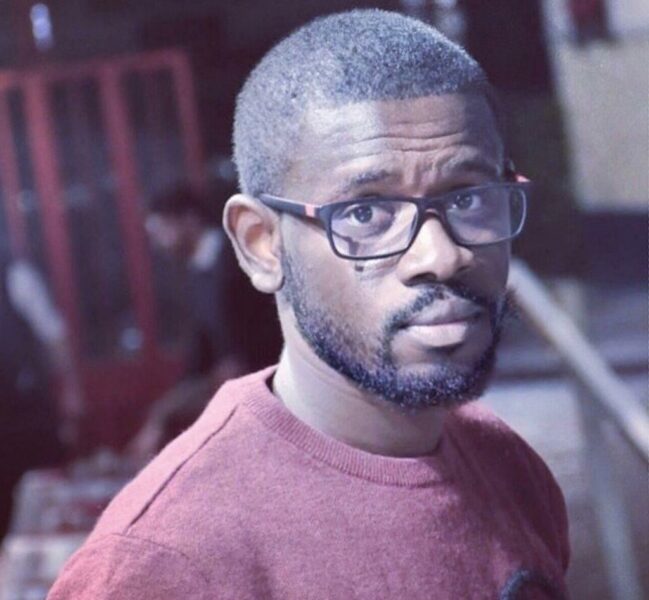
صورة ممنوحة من قبل الحاجي إبراهيما دياغو، مستخدمة بعد الموافقة
كجزء من سلسلتنا اليومية في إلقاء الضّوء على عمل النّاشطين الذّين يُروّجون اللّغات الإفريقية في الفضاءات الرّقمية، نقدّم الحاجي إبراهيما دياغو (@elibdiago) من السنغال.
مُتحدّث بلغة “الولوف“، لغة 10 ملايين من المُتحدثين كلغة أولى أو ثانية في السنغال ومناطق أخرى من إفريقيا الغربية. يُمكن الاستماع لعمله عبر البثّ الإذاعي “ولوف تاك” (Wolof Tech)، وهو برنامج يُبرز المُبادرات المُتعلقة بالتكنولوجيا.
رازين فويس (ر.ف): من فضلك، حدّثنا عن مسيرتك
El Hadji Ibrahima DIAGO (EHID): I am a computer engineer and podcaster for several years. I am Senegalese and a passionate of new technologies and that since my childhood. I created two years ago, a podcast called Wolof Tech which is a program that talks about new technologies in Wolof, a local language in Senegal spoken by over 90% of the population.
The podcast is organized in several seasons, each of which includes about ten episodes where we invite experts, entrepreneurs, professors, and students to discuss topics in new technologies.
الحاجي إبراهيما دياغو (ا.ح.إ.د): أنا مُهندس في الإعلام الآلي ومُذيع برنامج إذاعي منذ عدّة أعوام. أنا سنغالي وشغفي يتمثّل في التكنولوجيا الحديثة وهذا مُنذ صغري. أنشأتُ منذ عامين بثّ إذاعي اسمه “ولوف تاك”، وهو برنامج يتناول التكنولوجيا الحديثة بالولوف، وهي لغة محلية للسنغال ويتحدث بها أكثر من 90% من السُّكان.
ينقسم البثّ الإذاعي إلى عدّة أجزاء، يتناول كلّ جزء عشر حلقات، نستضيف خلالها خُبراء ورجال أعمال وأساتذة وطلبة للحديث عن مواضيع تتعلّق بالتكنولوجيا الحديثة.
(ر.ف): ما هي الوضعية الحالية للغتك على الإنترنيت وخارجه؟
EHID: Today, in the field of new technologies, the Wolof language is not very well represented. Most of the course materials are in French and English, which excludes a very large part of the population, i.e., the unschooled who represent 53% of the population.
(ا.ح.إ.د): حاليًا، الولوف غير مُمثّل كثيرًا في مجال التكنولوجيا الحديثة. إنّ مُعظم الوسائل التعليمية بالفرنسية أو الانجليزية، وهذا يُقصي جزءًا هامًا جدًا من الجماهير، أي غير المُتمدرسين، والذّين يُمثّلون 53% من السُّكان.
(ر.ف): ما هي مُحفّزاتك لتكون لُغتك حاضرة في الفضاءات الرّقمية؟
EHID: We believe that language is just a tool to access knowledge which is itself universal, it has no color or belonging. We can and must be able to use our mother tongue to access all kinds of knowledge. And this requires an enormous work to make the translation of the contents and the adaptation of some examples for a better understanding of the concepts.
We think that if we can make our populations understand the impact and the interest of these new technologies in their lives, they will be able to have new reflections to improve their life, their work etc…
A collaboration between the experts of the field and the populations in the need of change and evolution will be the beginning of a new era which will lead us towards the true development where all the parts will be implied with a great improvement of the levels of understanding.
(ا.ح.إ.د): نعتقدُ أنّ اللُّغة ليست إلاّ أداة للوصول إلى المعرفة، والتّي تُعتبر في حدّ ذاتها شاملة، لا تملك لونًا ولا أصلاً. يُمكننا وعلينا استعمال لُغتنا الأمّ للوصول إلى أيّ معرفة. وهذا يتطلّب عملاً جبارًا للقيام بترجمة المُحتويات واقتباس بعض الأمثلة من أجل استيعاب أمثل للمفاهيم.
نعتقد أنّه إذا تمكّنا من جعل الجماهير تستوعب الأثر والاهتمام بالتكنولوجيا الحديثة هذه في حياتهم، سيتمكنون من امتلاك أفكار جديدة لتحسين حياتهم وعملهم، إلخ.
إنّ التّعاون بين خبراء الحصة والجماهير المُتطلّعة إلى التّغيير والتّطوّر يكون بداية حقبة جديدة والتّي ستقودنا نحو التّقدّم الحقيقي حيث تكون جميع الأطراف مُتشاركة وهذا بتحسين كبير لمستوى الفهم.
(ر.ف): صفّ بعض الصُّعوبات التّي تمنع لغتك من الاستعمال الكامل على الإنترنت
EHID: The Wolof language is not taught at school in Senegal. It is not included in the school curriculum and this is the reason why our people cannot even write words correctly. Thus we notice a certain anarchy in the spelling of words especially in social networks.
(ا.ح.إ.د): إنّ لغة الولوف لا تُدرّس في السّنغال، وهي غير مُندمجة في برامج الدّراسة وهذا هو سبب أنّ أهالينا لا يُمكنهم حتّى كتابة الكلمات بطريقة صحيحة. لهذا نُلاحظ فوضى في الكتابة الإملائية للكلمات، لاسيما على مواقع التّواصل الاجتماعي.
(ر.ف): ما هي الاجراءات الملموسة التّي يُمكن اتخاذها لتحفيز شّباب كثيرين للشروع في تعلّم لغتهم أو مُواصلة استعمالها؟
EHID: The first step is to add Wolof to the list of languages to be learned in school programs up to university level.
It will also be necessary to promote the language through initiatives such as the podcast that we are doing and that is directly aimed at these populations.Today, as a French speaker in our companies, meetings with the participation of an English speaker turn directly to the use of English as a language of communication. So why not speak wolof between us for a better understanding especially since we have noticed that in some companies employees are often afraid to express the substance of their thoughts because they do not want to make mistakes.
So let's have the courage to value our languages by using them daily and correctly before they disappear. We owe it to the future generation.
(ا.ح.إ.د): تكمن الخطوة الأولى في إضافة الولوف لقائمة اللّغات الواجب تعلّمها في البرامج الدّراسية حتى المُستوى الجامعي. كما أنّه يبدو ضروريًا ترويجها عبر مُبادرات كالبرامج الإذاعية التّي نُقدّمها وهي مٌوجهة مُباشرة لهذه الجماهير.
حاليًا، كمواطن فرانكفوني في مؤسساتنا، فإنّ الاجتماعات التّي يُشارك فيها مُتحدّث باللّغة الانجليزية، فهي تُجرى مُباشرة باستعمال الانجليزية؛ لذلك لا نتحدث بالولوف بيننا لنتفاهم أحسن بكثير، لأنّنا غالبًا ما نخاف التّعبير عن جوهر أفكارنا فنحن لا نرغب أن نخطأ.
لذلك، لدينا الميزة لتقييم لغاتنا باستعمالها يوميًا وبصفة صحيحة قبل أن تندثر. هذا ما علينا فعله للأجيال القادمة.







